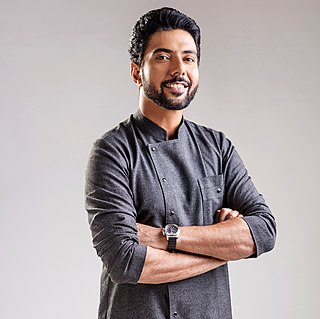A Quote by Mario Batali
Food is "everyday"-it has to be, or we would not survive for long. But food is never just something to eat. It is something to find or hunt or cultivate first of all.
Related Quotes
Food is "everyday"-it has to be, or we would not survive for long. But food is never just something to eat. It is something to find or hunt or cultivate first of all; for most of human history we have spent a much longer portion of our lives worrying about food, and plotting, working, and fighting to obtain it, than we have in any other pursuit. As soon as we can count on a food supply (and so take food for granted), and not a moment sooner, we start to civilize ourselves.
Secretly in my heart, I believe food is a doorway to almost every dimension of our existence. ... Food never was just food. From the time a cave person first came out from under a rock, food has been a little bit of everything: who we are spiritually as well as what keeps us alive. It's a gathering place, and in the best of all worlds it's possible that when people of one country sit down to eat another culture's food it will open their minds to the culture itself. Food is a doorway to understanding, and it can be as profound or as facile as you would like it to be.
I am not going to eat something that I have been told is not good for my system, and I do what I can to eat energy food, such as lean meats, whole grains, and lots of fruit and vegetables. Without this daily habit, my body would have given up a long time ago. There is no magic pill, no magic drink, no magic food.
I think there are two ways of eating, or cooking. One is restaurant food and one is home food. I believe that people have started making food that is easy that you want to eat at home. When you go out to a restaurant, you want to be challenged, you want to taste something new, you want to be excited. But when you eat at home, you want something that's delicious and comforting. I've always liked that kind of food - and frankly, that's also what I want to eat when I go out to restaurants, but maybe that's me.
Children, not a grain of the food we eat is made purely by our own effort. What comes to us in the form of food is the work of others, the bounty of Nature and God's compassion. Even if we have millions of dollars, we still need food to satisfy our hunger. Can we eat dollars? Therefore, never eat anything without first praying with humility.
When you look at food as an ethical issue in the Christian tradition, you don't find very much about it. You don't find, as you do in the Jewish or Islamic or Hindu traditions, a lot of restrictions saying you can eat this but you can't eat that. But what you do find is the idea that gluttony is a sin and that it's something that we ought to be ashamed of.
We need to realize that these industrial methods of farming have gotten us used to cheap food. The corollary of cheap food is low wages. What we need to do in an era when the price of food is going up is pay better wages. A living wage is an absolutely integral part of a modern food system, because you can't expect people to eat properly and eat in a sustainable way if you pay them nothing. In fact, it's cheap food that subsidized the exploitation of American workers for a very long time, and that's always been an aim of cheap food.
Somewhere between 50 to 60 percent of the food you eat has been touched by immigrant hands, and it is fair to say some of them are not here as they should be here. But if you didn't have these folks, you would be spending a lot more - three, four or five times more - for food, or we would have to import food and have all the food security risks.







































